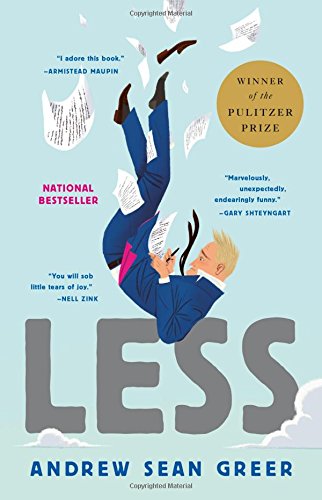A marvelously well-written, tour-de-world book which won the Pulitzer Prize for fiction. Read this book to experience the adventurous life and tumultuous thoughts of the protagonist. This book is a pleasure to read, an incandescent journey through life and love, while grappling with the voices in your head.

Less
By Andrew Sean Greer
Here are a few takeaways:
- The Plot
Arthur Less is the protagonist who is a minor American novelist who will soon turn fifty. He is most well known for being in a relationship with Robert Blackburn, a Pulitzer Prize winning poet. Less learns that his ex-boyfriend Freddy will soon marry someone else. In order to avoid the wedding, Less travels around the world: Mexico, Italy, Germany, France, Morocco, India, Japan, etc. Along the way, we learn about Less’ life and the travails of a gay, white novelist struggling to make sense of his passage, love, age, and status.How can so many things become a bore by middle age — philosophy, radicalism, and other fast foods – but heartbreak keeps it sting?
- An artist in need
As a middling novelist, Less’ new manuscript was rejected by the publisher. He’s learns the news from his literary agent Peter Hunt. The interplay between agent and artist was intriguing. I’ve found that all too often that ups and downs of artists (and for that matter most anyone with a pulse) is swayed by the opinions of others. In this passage, we learn the vulnerability of an artist hungry for recognition and validation.Freddy once joked that Less’s agent was his “great romance.” Yes, Peter Hunt knows Less intimately. He handles the struggles and fits and joys that no one else witnesses. And yet, about Peter Hunt, Less knows almost nothing at all. He cannot even recall where he is from. Minnesota? Is he married? How many clients does he have? Less has no idea, and yet, like a schoolgirl, he lives on Peter’s phone calls and messages. Or, more precisely, like a mistress waiting for word from her man.
Later, Less is advised never to win a literary prize. Because then that becomes your identity and career. And then there is not as much time for writing.
“Here’s my only advice. Don’t win one of these prizes.” She herself had won several, of course; she was in the Wharton Anthology of Poetry, which meant she was immortal. Like Athena coming down to advise young Telemachus. “You win a prize, and it’s all over. You lecture for the rest of your life. But you never write again.” She tapped a nail on his chest. “Don’t win one.” Then she kissed him on his cheek.
- Who is the narrator?
This is a central question of the book. It seems as if the narrator is an omnipresent narrator, but then the voice occasionally switches to the first person. There are some indicative and disorienting clues that Greer leaves along the away. But I don’t want to spoil the reveal for you.
- Waste Your Youth
This is a provocative idea. We have the rest of our lives to be adults, grown ups. It’s during our youth that we can drink, smoke, and do shit that gives us the most visceral experiences and memories. Since age is such a central theme to this book, the meditations on what to be doing during various parts of life is intriguing.“I think the saddest thing in the world is a twenty-five-year-old talking about the stock market. Or taxes. Or real estate, goddamn it! That’s all you’ll talk about when you’re forty. Real estate! Any twenty-five-year-old who says the word refinance should be taken out and shot. Talk about love and music and poetry. Things everyone forgets they ever thought were important. Waste every day, that’s what I say.”
- The Golden Years of Love
There are many meditations on love. What it is. What it isn’t. How to recognize it. When you’re in a relationship, how do you find balance and happiness? Is love more like taking care of the dog so that your partner can sleep in? Or is it like lightning striking? Do you live in fear that you haven’t experienced one of these forms? Here’s one take.the time when any couple has found its balance, and passion has quieted from its early scream, but gratitude is still abundant; what no one realizes are the golden years.
- On aging
Less and many who meets along his way are coping on aging. Greer uses age to describe most of the central characters, as if tracking them on a life abacus. The passages on aging are worth re-reading because they’re often a blend between tragedy and comedy.“Strange to be almost fifty, no? I feel like I just understood how to be young.” “Yes! It’s like the last day in a foreign country. You finally figure out where to get coffee, and drinks, and a good steak. And then you have to leave. And you won’t ever be back.”
- Quotables
Some noteworthy lines.I’m a narcissist; desperate is what we do.
She knows he is not a thief; he is clearly just an American.
Just as a gay couple cannot walk hand in hand down the streets of Marrakech, he thinks, two men, best friends, cannot walk hand in hand down the streets of Chicago.
Is this night a failure because it will end in an hour? Is the sun a failure because it’s going to end in a billion years? No, it’s the fucking sun. Why does a marriage not count?
We all recognize grief in moments that should be celebrations; it is the salt in the pudding.
Boredom is the only real tragedy for a writer; everything else is material.
0 Comments